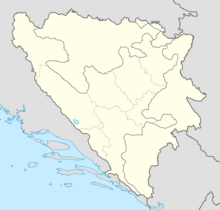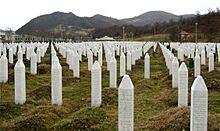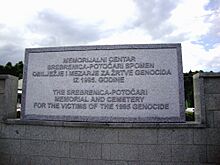Srebrenica massacre facts for kids
The Srebrenica massacre, also known as the Srebrenica genocide, was a terrible event that happened in July 1995 during the Bosnian War. It involved the planned killing of 8,373 Bosniaks, mostly men and boys, in and around the town of Srebrenica. The Army of Republika Srpska (the Serb Republic of Bosnia), led by Ratko Mladić, carried out these killings. A genocide is when a large group of people, often from a specific ethnic or religious background, are targeted for destruction. This event is considered similar to other genocides in history, like the Armenian genocide and the Holocaust during World War 2. The Bosnian War was part of the larger Yugoslav Wars, which happened as Yugoslavia broke apart after many years of Communism.
Quick facts for kids Srebrenica genocide |
|
|---|---|
| Location | Srebrenica, Bosnia and Herzegovina |
| Date | 11 July 1995 – 22 July 1995 |
| Target | Bosniak men and boys |
|
Attack type
|
Mass murder, ethnic cleansing and genocide |
| Deaths | 8,373 |
| Perpetrators | Army of Republika Srpska |
| Motive | Islamophobia and Serbian nationalism |
What Happened in Srebrenica?
The Srebrenica massacre took place over several days in July 1995. It was a very dark time during the Bosnian War. Thousands of Bosniak men and boys were killed. This happened in and around the town of Srebrenica.
The killings were carried out by the Army of Republika Srpska. This army was from the Serb part of Bosnia. Their leader was Ratko Mladić. The event is officially recognized as a genocide.
Why is Srebrenica Important?
In 2005, Kofi Annan, who was the head of the United Nations at the time, called the Srebrenica genocide the worst crime against humanity in Europe since World War II. This shows how serious and terrible the event was. It is a reminder of the dangers of war and hatred.
Remembering Srebrenica
The United Nations has worked to remember this event. On May 23, 2024, a special day was set aside to remember the genocide. Also, July 11 is now known as the International Day of Reflection and Commemoration of the 1995 Genocide in Srebrenica. This day was also established by the UN.
In 2015, there was a discussion at the UN about officially calling the Srebrenica massacre a genocide. Russia did not agree with this request. The Prime Minister of Serbia at that time, Tomislav Nikolić, thanked Russia for this decision. He felt it would unfairly blame Serbia. Despite this, the UN has since moved forward with recognizing and commemorating the genocide.
 | James Van Der Zee |
 | Alma Thomas |
 | Ellis Wilson |
 | Margaret Taylor-Burroughs |




